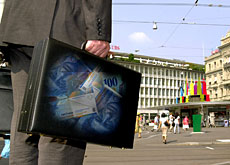Financial system “could yet collapse”

An eminent political economist has warned that the global financial system is still perilously close to breakdown despite a raft of government rescue packages.
Professor Peter Katzenstein said the industry is exposed to trillions of dollars of bets that could still turn sour. Switzerland would be particularly vulnerable if the financial crisis develops further.
Governments around the world have pumped trillions of dollars into the financial industry to prop up individual institutions, cover toxic assets and to give banks the confidence to start loaning to each other again.
The Swiss National Bank announced a $60 billion (SFr67 billion) bailout of Switzerland’s largest bank, UBS, in October. UBS and Credit Suisse have between them written down some $55 billion as a result of the subprime mortgage collapse, and that figure could rise.
But Katzenstein, professor of international studies at Cornell University in New York, warned that the three bailouts are dwarfed by the existence of more than $50 trillion in complicated investments that have flooded the market in recent years.
While the total volume of these investments can be reasonably estimated, the unregulated nature of the system means that nobody knows exactly how they were distributed or the potential liabilities each institution now holds.
Systematic collapse
“Every bank, including those in Switzerland, has a certain number of these assets and they don’t know how to value them. How does a global financial system work when you don’t know how to value assets?” Katzenstein told swissinfo.
Katzenstein, speaking at the annual conference of the Swiss Political Science Association at St Gallen University, said there was misplaced optimism that the financial industry was now saved.
“The general perception is that the system is coming back because the Dow Jones [a leading Wall Street market index] is between 8,000 and 9,000 points. But the Dow Jones could be at 3,000 – the possibility of systemic collapse is really there,” he said.
“If that were to happen, the Swiss system would go and Switzerland could turn out like Iceland [whose currency collapsed and three largest banks were nationalised in October]. It would take just one bank being wiped out. Things that were once inconceivable are now conceivable and that’s quite disorienting.”
Switzerland is particularly exposed to a financial meltdown because the total assets of banks amount to around nine times the national gross domestic product (GDP) – far greater than in any other country. The state would be unable to bail out the industry if a significant chunk of these assets lost value.
Defending the system
Katzenstein has previously praised the Swiss political and economic system for being flexible enough to cope with the declining watch industry. But he believes that developments in the financial sector have now outstripped the country’s capacity to absorb a break down.
However, Katzenstein is confident that Switzerland’s policy makers and financial leaders are fully aware of the dangers and would fight hard to protect the industry.
“The Swiss are very aware of what is happening because it is a banking culture and they would mobilise every last franc to defend this system,” he said.
swissinfo, Matthew Allen in St Gallen
The global financial system developed a method for insuring institutions against a plethora of new risky investments that sprang up in recent years.
The most common form of insurance was the credit default swap (CDS) that was commonly sold alongside risky investments, such as subprime mortgage securities.
A bank buying such securities would take out a CDS contract with another bank that would promise to cover the cost of the investment going bad in exchange for a regular fee.
These instruments were called “risk swaps” rather than insurance policies to remain free of such regulations that required the policy issuer to put aside enough capital to cover a default payout.
Invented primarily as a means of hedging against risk, the instruments took on a new life when they began to be issued and traded as a bet against institutions folding and defaulting on their obligations.
If a company looked like it was in trouble, Bank A could pay a fixed sum to Bank B to insure it against the company going bust. If that happened, Bank B would pay Bank A for the outstanding liabilities the company could no longer afford to honour.
This transaction could occur even if Bank A had no exposure to the company.
The unregulated nature of the trade means that nobody knows exactly how many such instruments are in the marketplace, who issued them and who holds them. Voluntarily released data shows the volume to be worth between $50-55 trillion.

In compliance with the JTI standards
More: SWI swissinfo.ch certified by the Journalism Trust Initiative












You can find an overview of ongoing debates with our journalists here . Please join us!
If you want to start a conversation about a topic raised in this article or want to report factual errors, email us at english@swissinfo.ch.